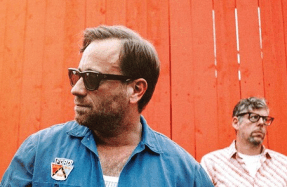THESE THINGS TAKE TIME


was on friendly terms with Smiths’ guitar maestro Johnny Marr. We met when he was working in a pretty cool, alternative clothing store in Manchester, England, and he recognized me from the band that I was in, Private Sector. I’d see him in the store, at shows of other bands and some of my own shows, and we used to talk music, of course, and often the guitar in particular. We seemed to have a lot of musical interests in common, but I lost track of Johnny a few months before he formed the Smiths with Morrissey, and we never reconnected after that time. I remember being very curious to see what his new band would come up with, and when a mutual acquaintance, who had been at one of their earliest live shows at the Ritz, in Manchester, in 1982, recounted what the band sounded like, we were both initially a little nonplussed. Given Morrissey’s long-avowed love of the New York Dolls and Marr’s rock and roll stylings, we had expected something along much more conventional lines. Of course, the Smiths were anything but conventional, and yet they used the most conventional of formats — a guitar, bass, drums and a vocal — to create something that was extraordinarily unique, and which would influence legions of musicians on both sides of the Atlantic for the next 40 years. The arrival of the Smiths in 1983, with the release of their debut single, “Hand in Glove,” came at a time when the U.K. music scene was a strangely divided place. At that point there were four weekly music papers: (), , and . Of the four, and acted as both tastemakers and reflectors of what was current. They divided, fairly neatly, into two camps: continued to promote punk and its offshoot genre, “Oi” music, and also championed the emerging New Wave of British Heavy Metal (NWOBHM). The saw itself as defiantly anti what had gone before, ignoring the burgeoning metal scene, and instead decided that anything rock was inherently bad. Several journalists started to liberally use the terms and as pejoratively derisory digs at anything a band did that could fall under the traditional rock ethos. Thus, no guitar solos, no guitar riffs, no guitar heroes, no macho posturing, no extravagant stage shows, no rock and roll excess and so on.
You’re reading a preview, subscribe to read more.
Start your free 30 days



